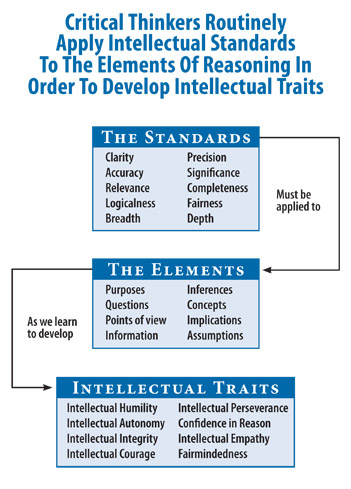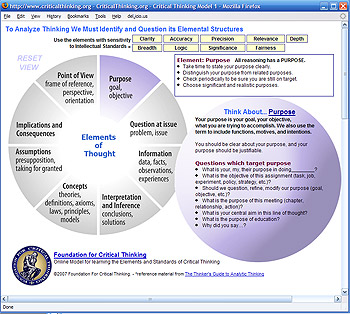- Our Team of Presenters
- Fellows of the Foundation
- Dr. Richard Paul
- Dr. Linda Elder
- Dr. Gerald Nosich
- Contact Us - Office Information
- Permission to Use Our Work
- Create a CriticalThinking.Org Account
- Contributions to the Foundation for Critical Thinking
- Testimonials
- Center for Critical Thinking
- The National Council for Excellence in Critical Thinking
- International Center for the Assessment of Higher Order Thinking
- Library of Critical Thinking Resources
- Professional Development
- Inservice Information Request Form
- Certification Online Course
- The State of Critical Thinking Today
- Higher Education
- K-12 Instruction
- Customized Webinars and Online Courses for Faculty
- Business & Professional Groups
- The Center for Critical Thinking Community Online
- Certification in the Paul-Elder Approach to Critical Thinking
- Professional Development Model - College and University
- Professional Development Model for K-12
- Workshop Descriptions
- Online Courses in Critical Thinking
- Critical Thinking Training for Law Enforcement
- Consulting for Leaders and Key Personnel at Your Organization
- Critical Thinking Therapy
- Conferences & Events
- Upcoming Learning Opportunities
- 2024 Fall Academy on Critical Thinking
- Daily Schedule
- Transportation, Lodging, and Social Functions
- Critical Thinking Therapy Release & Book Signing
- Academy Presuppositions
- 45th Annual Conference: Dates
- Presuppositions of the Conference
- Call for Proposals
- Conference Archives
- 44th Annual International Conference on Critical Thinking
- Focal Session Descriptions
- Guest Presentation Program
- Presuppositions of the 44th Annual International Conference on Critical Thinking
- Recommended Reading
- 43rd Annual International Conference on Critical Thinking
- Register as an Ambassador
- Testimonials from Past Attendees
- Thank You to Our Donors
- 42nd Annual International Conference on Critical Thinking
- Overview of Sessions (Flyer)
- Presuppositions of the Annual International Conference
- Testimonials from Past Conferences
- 41st Annual International Conference on Critical Thinking
- Recommended Publications
- Dedication to Our Donors
- 40th Annual International Conference on Critical Thinking
- Session Descriptions
- Testimonials from Prior Conferences
- International Critical Thinking Manifesto
- Scholarships Available
- 39th Annual International Conference on Critical Thinking
- Travel and Lodging Info
- FAQ & General Announcements
- Focal and Plenary Session Descriptions
- Program and Proceedings of the 39th Annual International Conference on Critical Thinking
- The Venue: KU Leuven
- Call for Critical Thinking Ambassadors
- Conference Background Information
- 38th Annual International Conference on Critical Thinking
- Call for Ambassadors for Critical Thinking
- Conference Focal Session Descriptions
- Conference Concurrent Session Descriptions
- Conference Roundtable Discussions
- Conference Announcements and FAQ
- Conference Program and Proceedings
- Conference Daily Schedule
- Conference Hotel Information
- Conference Academic Credit
- Conference Presuppositions
- What Participants Have Said About the Conference
- 37th Annual International Conference on Critical Thinking
- Registration & Fees
- FAQ and Announcements
- Conference Presenters
- 37th Conference Flyer
- Program and Proceedings of the 37th Conference
- 36th International Conference
- Conference Sessions
- Conference Flyer
- Program and Proceedings
- Academic Credit
- 35th International Conference
- Conference Session Descriptions
- Available Online Sessions
- Bertrand Russell Distinguished Scholar - Daniel Ellsberg
- 35th International Conference Program
- Concurrent Sessions
- Posthumous Bertrand Russell Scholar
- Hotel Information
- Conference FAQs
- Visiting UC Berkeley
- 34th INTERNATIONAL CONFERENCE
- Bertrand Russell Distinguished Scholar - Ralph Nader
- Conference Concurrent Presenters
- Conference Program
- Conference Theme
- Roundtable Discussions
- Flyer for Bulletin Boards
- 33rd INTERNATIONAL CONFERENCE
- 33rd International Conference Program
- 33rd International Conference Sessions
- 33rd International Conference Presenters
- The Bertrand Russell Distinguished Scholars Critical Thinking Conversations
- 33rd International Conference - Fees & Registration
- 33rd International Conference Concurrent Presenters
- 33rd International Conference - Hotel Information
- 33rd International Conference Flyer
- 32nd INTERNATIONAL CONFERENCE
- 32nd Annual Conference Sessions
- 32nd Annual Conference Presenter Information
- 32nd Conference Program
- The Bertrand Russell Distinguished Scholars Critical Thinking Lecture Series
- 32nd Annual Conference Concurrent Presenters
- 32nd Annual Conference Academic Credit
- 31st INTERNATIONAL CONFERENCE
- 31st Conference Sessions
- Comments about previous conferences
- Conference Hotel (2011)
- 31st Concurrent Presenters
- Registration Fees
- 31st International Conference
- 30th INTERNATIONAL CONFERENCE ON CRITICAL THINKING
- 30th International Conference Theme
- 30th Conference Sessions
- PreConference Sessions
- 30th Concurrent Presenters
- 30th Conference Presuppositions
- Hilton Garden Inn
- 29th International Conference
- 29th Conference Theme
- 29th Conference Sessions
- 29th Preconference Sessions
- 29th Conference Concurrent Sessions
- 2008 International Conference on Critical Thinking
- 2008 Preconference Sessions (28th Intl. Conference)
- 2007 Conference on Critical Thinking (Main Page)
- 2007 Conference Theme and sessions
- 2007 Pre-Conference Workshops
- 2006 Annual International Conference (archived)
- 2006 International Conference Theme
- 2005 International Conference (archived)
- Prior Conference Programs (Pre 2000)
- Workshop Archives
- Spring 2022 Online Workshops
- 2021 Online Workshops for Winter & Spring
- 2019 Seminar for Military and Intelligence Trainers and Instructors
- Transportation, Lodging, and Recreation
- Seminar Flyer
- 2013 Spring Workshops
- Our Presenters
- 2013 Spring Workshops - Hotel Information
- 2013 Spring Workshops Flyer
- 2013 Spring Workshops - Schedule
- Spring Workshop 2012
- 2012 Spring Workshop Strands
- 2012 Spring Workshop Flier
- 2011 Spring Workshop
- Spring 2010 Workshop Strands
- 2009 Spring Workshops on Critical Thinking
- 2008 SPRING Workshops and Seminars on Critical Thinking
- 2008 Ethical Reasoning Workshop
- 2008 - On Richard Paul's Teaching Design
- 2008 Engineering Reasoning Workshop
- 2008 Academia sobre Formulando Preguntas Esenciales
- Fellows Academy Archives
- 2017 Fall International Fellows Academy
- 4th International Fellows Academy - 2016
- 3rd International Fellows Academy
- 2nd International Fellows Academy
- 1st International Fellows Academy
- Academy Archives
- October 2019 Critical Thinking Academy for Educators and Administrators
- Transportation, Lodging, and Leisure
- Advanced Seminar: Oxford Tutorial
- Recreational Group Activities
- Limited Scholarships Available
- September 2019 Critical Thinking Educators and Administrators Academy
- 2019 Critical Thinking Training for Trainers and Advanced Academy
- Academy Flyer
- Seattle, WA 2017 Spring Academy
- San Diego, CA 2017 Spring Academy
- 2016 Spring Academy -- Washington D.C.
- 2016 Spring Academy -- Houston, TX
- The 2nd International Academy on Critical Thinking (Oxford 2008)
- 2007 National Academy on Critical Thinking Testing and Assessment
- 2006 Cambridge Academy (archived)
- 2006 Cambridge Academy Theme
- 2006 Cambridge Academy Sessions
- Accommodations at St. John's College
- Assessment & Testing
- A Model for the National Assessment of Higher Order Thinking
- International Critical Thinking Essay Test
- Online Critical Thinking Basic Concepts Test
- Online Critical Thinking Basic Concepts Sample Test
- Consequential Validity: Using Assessment to Drive Instruction
- News & Announcements
- Newest Pages Added to CriticalThinking.Org
- Online Learning
- Critical Thinking Online Courses
- Critical Thinking Blog
- 2019 Blog Entries
- 2020 Blog Entries
- 2021 Blog Entries
- 2022 Blog Entries
- 2023 Blog Entries
- Online Courses for Your Students
- 2023 Webinar Archives
- 2022 Webinar Archives
- 2021 Webinar Archive
- 2020 Webinar Archive
- Guided Study Groups
- Critical Thinking Channel on YouTube
- CT800: Fall 2024

Translate this page from English...
*Machine translated pages not guaranteed for accuracy. Click Here for our professional translations.

Critical Thinking: Where to Begin

- For College and University Faculty
- For College and University Students
- For High School Teachers
- For Jr. High School Teachers
- For Elementary Teachers (Grades 4-6)
- For Elementary Teachers (Kindergarten - 3rd Grade)
- For Science and Engineering Instruction
- For Business and Professional Development
- For Nursing and Health Care
- For Home Schooling and Home Study
If you are new to critical thinking or wish to deepen your conception of it, we recommend you review the content below and bookmark this page for future reference.
Our Conception of Critical Thinking...

"Critical thinking is the intellectually disciplined process of actively and skillfully conceptualizing, applying, analyzing, synthesizing, and/or evaluating information gathered from, or generated by, observation, experience, reflection, reasoning, or communication, as a guide to belief and action. In its exemplary form, it is based on universal intellectual values that transcend subject matter divisions: clarity, accuracy, precision, consistency, relevance, sound evidence, good reasons, depth, breadth, and fairness..."
"Critical thinking is self-guided, self-disciplined thinking which attempts to reason at the highest level of quality in a fairminded way. People who think critically attempt, with consistent and conscious effort, to live rationally, reasonably, and empathically. They are keenly aware of the inherently flawed nature of human thinking when left unchecked. They strive to diminish the power of their egocentric and sociocentric tendencies. They use the intellectual tools that critical thinking offers – concepts and principles that enable them to analyze, assess, and improve thinking. They work diligently to develop the intellectual virtues of intellectual integrity, intellectual humility, intellectual civility, intellectual empathy, intellectual sense of justice and confidence in reason. They realize that no matter how skilled they are as thinkers, they can always improve their reasoning abilities and they will at times fall prey to mistakes in reasoning, human irrationality, prejudices, biases, distortions, uncritically accepted social rules and taboos, self-interest, and vested interest.
They strive to improve the world in whatever ways they can and contribute to a more rational, civilized society. At the same time, they recognize the complexities often inherent in doing so. They strive never to think simplistically about complicated issues and always to consider the rights and needs of relevant others. They recognize the complexities in developing as thinkers, and commit themselves to life-long practice toward self-improvement. They embody the Socratic principle: The unexamined life is not worth living , because they realize that many unexamined lives together result in an uncritical, unjust, dangerous world."
Why Critical Thinking?

The Problem:
Everyone thinks; it is our nature to do so. But much of our thinking, left to itself, is biased, distorted, partial, uninformed, or down-right prejudiced. Yet the quality of our lives and that of what we produce, make, or build depends precisely on the quality of our thought. Shoddy thinking is costly, both in money and in quality of life. Excellence in thought, however, must be systematically cultivated.
A Brief Definition:
Critical thinking is the art of analyzing and evaluating thinking with a view to improving it. The Result:
A well-cultivated critical thinker:
- raises vital questions and problems, formulating them clearly and precisely;
- gathers and assesses relevant information, using abstract ideas to interpret it effectively;
- comes to well-reasoned conclusions and solutions, testing them against relevant criteria and standards;
- thinks openmindedly within alternative systems of thought, recognizing and assessing, as need be, their assumptions, implications, and practical consequences; and
- communicates effectively with others in figuring out solutions to complex problems.
Critical thinking is, in short, self-directed, self-disciplined, self-monitored, and self-corrective thinking. It requires rigorous standards of excellence and mindful command of their use. It entails effective communication and problem-solving abilities, and a commitment to overcoming our native egocentrism and sociocentrism. Read more about our concept of critical thinking .

The Essential Dimensions of Critical Thinking

Our conception of critical thinking is based on the substantive approach developed by Dr. Richard Paul and his colleagues at the Center and Foundation for Critical Thinking over multiple decades. It is relevant to every subject, discipline, and profession, and to reasoning through the problems of everyday life. It entails five essential dimensions of critical thinking:
At the left is an overview of the first three dimensions. In sum, the elements or structures of thought enable us to "take our thinking apart" and analyze it. The intellectual standards are used to assess and evaluate the elements. The intellectual traits are dispositions of mind embodied by the fairminded critical thinker. To cultivate the mind, we need command of these essential dimensions, and we need to consistently apply them as we think through the many problems and issues in our lives.
The Elements of Reasoning and Intellectual Standards

To learn more about the elements of thought and how to apply the intellectual standards, check out our interactive model. Simply click on the link below, scroll to the bottom of the page, and explore the model with your mouse.
Why the Analysis of Thinking Is Important If you want to think well, you must understand at least the rudiments of thought, the most basic structures out of which all thinking is made. You must learn how to take thinking apart. Analyzing the Logic of a Subject When we understand the elements of reasoning, we realize that all subjects, all disciplines, have a fundamental logic defined by the structures of thought embedded within them. Therefore, to lay bare a subject’s most fundamental logic, we should begin with these questions:

Going Deeper...

The Critical Thinking Bookstore
Our online bookstore houses numerous books and teacher's manuals , Thinker's Guides , videos , and other educational materials .
Learn From Our Fellows and Scholars
Watch our Event Calendar , which provides an overview of all upcoming conferences and academies hosted by the Foundation for Critical Thinking. Clicking an entry on the Event Calendar will bring up that event's details, and the option to register. For those interested in online learning, the Foundation offers accredited online courses in critical thinking for both educators and the general public, as well as an online test for evaluating basic comprehension of critical thinking concepts . We are in the process of developing more online learning tools and tests to offer the community.
Utilizing this Website
This website contains large amounts research and an online library of articles , both of which are freely available to the public. We also invite you to become a member of the Critical Thinking Community , where you will gain access to more tools and materials. If you cannot locate a resource on a specific topic or concept, try searching for it using our Search Tool . The Search Tool is at the upper-right of every page on the website.

Critical Thinking: What It Is and Why It Matters
Defining critical thinking dispositions and why they’re crucial..
Posted September 23, 2024 | Reviewed by Devon Frye
- Another way to think about and measure critical thinking is to include aspects of motivational dispositions.
- Dispositions include open-mindedness and a willingness to be reflective when evaluating information.
- People scoring low in critical thinking dispositions tend to “keep it simple” when something is complex.
- Critical thinking dispositions help individuals avoid oversimplification and can facilitate awareness of bias.
Critical thinking springs from the notion of reflective thought proposed by Dewey (1933), who borrowed from the work of philosophers such as William James and Charles Peirce. Reflective thought was defined as the process of suspending judgment, remaining open-minded, maintaining a healthy skepticism, and taking responsibility for one’s own development (Gerber et al., 2005; Stoyanov & Kirshner, 2007).

Kurland (1995) suggested, “Critical thinking is concerned with reason, intellectual honesty, and open-mindedness, as opposed to emotionalism, intellectual laziness, and closed-mindedness. Thus, critical thinking involves… considering all possibilities… being precise; considering a variety of possible viewpoints and explanations; weighing the effects of motives and biases; being concerned more with finding the truth than with being right…being aware of one’s own prejudices and biases” (p. 3). Thus, being able to perspective-take and becoming conscious of one’s own biases are potential benefits of critical thinking capacities.
Reviews of the critical thinking literature (e.g., Bensley, 2023) suggest that the assessment of this construct ought to include aspects of motivational dispositions. Numerous frameworks of critical thinking dispositions have been proposed (e.g., Bensley, 2018; Butler & Halpern, 2019; Dwyer, 2017); some commonly identified dispositions are open-mindedness, intellectual engagement, and a proclivity to take a reflective stance or approach to evaluating information and the views and beliefs of both oneself and others. Demir (2022) posited that critical thinking dispositions reflect persons’ attitudes toward and routine ways of responding to new information and diverging ideas, willingness to engage in nuanced and complex rather than either/or reductionistic thinking, and perseverance in attempts to understand and resolve complex problems.
Other examples of dispositions are inquisitiveness, open-mindedness, tolerance for ambiguity, thinking about thinking, honesty in assessing or evaluating biases, and willingness to reconsider one’s own views and ways of doing things (Facione et al., 2001). Individual personality attributes associated with these proclivities include a need for cognition (a desire for intellectual stimulation), which is positively associated with critical thinking, and the need for closure (a motivated cognitive style in which individuals prefer predictability, firm answers, and rapid decision making ) and anti-intellectualism (a resentment of “the life of the mind” and those who represent it), both negatively associated with critical thinking.
Further, an ideological component that can impede critical thinking is dogmatism . In addition, rigid, dichotomous thinking impedes critical thinking in that it oversimplifies the complexity of social life in a pluralistic society (Bensley, 2023; Cheung et al., 2002; Halpern & Dunn, 2021) and tries to reduce complicated phenomena and resolve complex problems via “either/or” formulations and simplistic solutions.
In other words, folks with low critical thinking dispositions would tend to “keep it simple” when something is really quite complicated, and think it absolute terms and categories rather than seeing “the gray” in between the black and white extremes.
In sum, critical thinking dispositions are vitally important because they may help individuals avoid oversimplifying reality; they also permit perspective-taking and can facilitate their awareness of diversity and systematic biases, such as racial or gender bias . Some research has indicated that critical thinking dispositions uniquely contribute to academic performance beyond general cognition (Ren et al., 2020), and may help to reduce unsubstantiated claims and conspiracy beliefs (Bensley, 2023; Lantian et al., 2021).
But before we can study the potential impact of critical thinking dispositions, it is necessary to have a reliable, valid, and hopefully brief measure for this construct. I will discuss the development and validation of a measure of critical thinking dispositions in another post.
Bensley, D.A. ( 2023.) Critical thinking, intelligence, and unsubstantiated beliefs: An integrative review. Journal of Intelligence, 1 , 207. https://doi.org/10.3390/jintelligence11110207
Bensley, D.A. (2018). Critical thinking in psychology and everyday life: A guide to effective thinking . New York: Worth Publishers.
Butler, H.A., & Halpern, D.F. (2019). Is critical thinking a better model of intelligence? In Robert J. Sternberg (Ed.) The Nature of Intelligence (pp. 183–96). Cambridge: Cambridge University Press.
Cheung, C.-K, Rudowicz. E., Kwan, A., & Yue, X.. (2002). Assessing university students’ general and specific criticalthinking. College Student Journal, 36 , 504 – 25.
Demir, E. (2022). An examination of high school students’ critical thinking dispositions and analytical thinking skills. Journal of Pedagogical Research, 6 , 190–200. https://doi.org/10.33902/JPR.202217357
Dewey, J. (1933). How we think: A restatement of the relation of reflective thinking to the educative process . Lexington: Heath and Company.
Dwyer, C. P. (2017). Critical thinking: Conceptual perspectives and practical guidelines . Cambridge: CambridgeUniversity Press.
Facione, P., Facione, N,C,, & Giancarlo, C.A.F. (2001(. California Critical Disposition Inventory . Millbrae: California Academic Press.
Gerber, S., Scott, L., Clements, D.H., & Sarama, J. (2005). Instructor influence on reasoned argument in discussion boards. Educational Technology, Research & Development, 53 , 25–39. https://doi.org/10.1007/BF02504864
Halpern, D. F., & Dunn, D.S. (2021). Critical thinking: A model of intelligence for solving real-world problems. Journal of Intelligence, 9 , 22. https://doi.org/10.3390/jintelligence9020022
Kurland, D. (1995). I know what it says… What does it mean? Critical skills for critical reading . Belmont: Wadsworth.
Lantian, A., Bagneux, V., Delouvee, S., & Gauvrit, N. (2021). Maybe a free thinker but not a critical one: High conspiracybelief is associated with low critical thinking ability. Applied Cognitive Psychology, 35 , 674 – 84. https://doi.org/10.1002/acp.3790
Ren, X., Tong, Y., Peng, P. & Wang, T. (2020). Critical thinking predicts academic performance beyond general cognitiveability: Evidence from adults and children. Intelligence, 82 , 101487. https://doi.org/10.1016/j.intell.2020.101487
Stoyanov, S., & Kirschner, P. ( 2007). Effect of problem solving support and cognitive styles on idea generation:Implications for technology-enhanced learning. Journal of Research on Technology in Education, 40 , 49–63. https://doi.org/10.1080/15391523.2007.10782496

Kyle D. Killian, Ph.D., LMFT is the author of Interracial Couples, Intimacy and Therapy: Crossing Racial Borders.
- Find a Therapist
- Find a Treatment Center
- Find a Psychiatrist
- Find a Support Group
- Find Online Therapy
- United States
- Brooklyn, NY
- Chicago, IL
- Houston, TX
- Los Angeles, CA
- New York, NY
- Portland, OR
- San Diego, CA
- San Francisco, CA
- Seattle, WA
- Washington, DC
- Asperger's
- Bipolar Disorder
- Chronic Pain
- Eating Disorders
- Passive Aggression
- Personality
- Goal Setting
- Positive Psychology
- Stopping Smoking
- Low Sexual Desire
- Relationships
- Child Development
- Self Tests NEW
- Therapy Center
- Diagnosis Dictionary
- Types of Therapy

When we fall prey to perfectionism, we think we’re honorably aspiring to be our very best, but often we’re really just setting ourselves up for failure, as perfection is impossible and its pursuit inevitably backfires.
- Emotional Intelligence
- Gaslighting
- Affective Forecasting
- Neuroscience

IMAGES
VIDEO